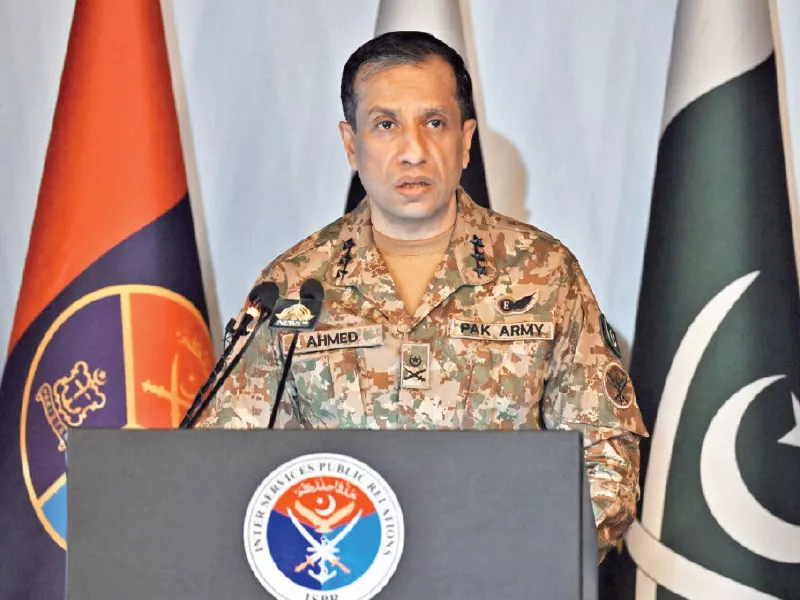Inter-Services Public Relations (ISPR) Director General Lt Gen Ahmed Sharif Chaudhry has issued a stern warning to India about the dangers of weaponizing water, emphasizing that such actions could have repercussions that resonate for generations. This comes as tensions rise, with New Delhi threatening to cut off the flow of Indus River waters.
In an interview with Arab News, DG ISPR Lt Gen Ahmed Sharif Chaudhry expressed that any attempt by India to block Pakistan’s water supply would be crossing a significant line.
“It takes a madman to think he can stop the water for over 240 million people in this country,” he remarked.
“I sincerely hope we never reach that point, but if such actions occur, the world will witness the fallout, and we will be fighting those consequences for years, even decades. No one should dare to stop Pakistan’s water.”
These strong statements come in response to India’s recent unilateral suspension of the long-standing Indus Waters Treaty, which followed a tragic attack on tourists in Indian Illegally Occupied Jammu and Kashmir (IIOJK) that New Delhi attributed to Pakistan—a claim that Islamabad has firmly rejected.
Since then, the region has been teetering on the edge. In early May, India launched a series of cross-border strikes, not just along the Line of Control (LoC) but also into Pakistan’s mainland, claiming to target militant hideouts.
Pakistan retaliated by striking 26 Indian military sites before a ceasefire, brokered by the US, brought hostilities to a stop on May 10.
Yet, the peace remains tenuous. Indian Prime Minister Narendra Modi’s recent announcement to cut off Indus waters flowing into Pakistan has reignited fears of further escalation. For Islamabad, this move is seen as an act of war.
Despite the ceasefire, the DG ISPR reiterated Pakistan’s commitment to peace, while remaining vigilant.
“The Pakistan armed forces are a professional military, and we honor the commitments we make. We follow the directives of our political leadership and uphold the agreements they establish,” he stated.
“When it comes to the Pakistan Army, this ceasefire is expected to hold without any issues, and there have been positive steps in communication between both sides,” he mentioned.
Since the truce began, both countries have been trading accusations of ceasefire violations, a pattern that could easily upset the delicate balance once more. Chaudhry emphasized that Pakistan’s reactions have been measured and targeted.
“If any violations occur, we always respond… but our focus is solely on those posts and positions responsible for the ceasefire breaches. We never aim at civilians or any civilian infrastructure.”
The DG ISPR disclosed that India lost six aircraft, including French-made Rafales and a Mirage 2000, along with a valuable Russian S-400 air defense system during the four-day confrontation.
Earlier reports had indicated five losses, but Prime Minister Shehbaz Sharif confirmed the sixth loss this week.
“I can confirm that the sixth aircraft is a Mirage 2000,” Lt Gen Chaudhry stated. “Our focus was solely on the aircraft… We could have taken out more, but we chose to exercise restraint,” he added.
Looking to the future, Chaudhry cautioned that the threat of renewed conflict will linger in the region unless the central issue—Kashmir—is tackled directly.
“Their approach to Kashmir isn’t working,” he remarked. “As long as the Indians refuse to engage in dialogue about Kashmir, the potential for conflict remains as we, as two nations, need to find a solution together.”
‘Peace is our top priority’
In a strong response to regional misconceptions, the DG ISPR asserted that Pakistan is not an aggressive player but a nation that prioritizes peace above everything else.
“We are not a violent nation; we are a serious one. Our foremost priority is peace,” Lt Gen Chaudhry told RT Arabic in an interview, as reported by PTV News.
“Wise and influential nations like the United States understand the true spirit of the Pakistani people,” he added.

Peeling back the layers of the ceasefire negotiations following Pakistan’s retaliatory Operation Bunyan-un-Marsoos, Lt Gen Chaudhry shared that the initial call for a truce actually came from the Indian side.
He mentioned that a spokesperson from India’s defense ministry had “personally requested a ceasefire.”
“We want peace and stability, so we thought, why not?” he was quoted as saying by PTV News.
Recognizing the diplomatic efforts that led to the agreement, the military spokesperson praised the Pakistani diplomats for stepping up with “great wisdom and in an extraordinary manner.”
“Pakistan, showing great maturity, responded quickly, firmly, and effectively, making the enemy confront reality,” he asserted, referring to the downing of five Indian jets in retaliation for India’s deadly airstrikes on the night of May 6-7.
“The nation and the Pakistan armed forces stood united like an unbreakable wall,” he added.
Reflecting on the tense events of May 9-10, Lt Gen Chaudhry recounted how the conflict was on the verge of escalating as both sides displayed their military might. He noted that India launched more missiles overnight in an attempt to intimidate Pakistan, but they underestimated the nation’s determination.
“The enemy fired more missiles on the night of May 9 and 10 to scare us. India forgot that the people of Pakistan and its forces neither bow nor can be made to bow. On the morning of May 10, we responded, targeting only their military objectives with the utmost responsibility and caution,” he stated.
“Not a single civilian target was harmed; it was a fair, just, and balanced response,” he emphasized.
‘India rejected logical neutral probe’
When discussing the roots of the conflict, the DG ISPR emphasized that to truly grasp the tensions between Pakistan and India, one must consider the larger context.
“India is hiding behind a misleading narrative to cover up the truth,” he remarked, referencing the Pahalgam incident. He noted that while Indian media was quick to blame Pakistan just minutes after the event, their own foreign office acknowledged two days later that investigations were still ongoing.
“What’s the sense in making accusations without any investigation or evidence?” he asked.
Lt Gen Chaudhry highlighted that the Pakistani government had taken a principled approach by offering to collaborate on a neutral and unbiased investigation, a proposal that New Delhi outright rejected.
“India turned down this reasonable offer and, acting on its own, launched missiles at our mosques, killing children, women, and the elderly,” he stated.
Reaffirming the military’s steadfast commitment, the ISPR chief stressed that safeguarding the nation’s territorial integrity is a sacred duty.
“The sacred responsibility given to the Pakistan armed forces is to defend the country’s sovereignty and borders,” he said, adding that the forces have upheld this duty and will “continue to do so at all costs.”
The DG ISPR also reiterated long-standing concerns about India’s alleged involvement in destabilizing Pakistan through covert support for terrorism.
“India is the true backer of the ongoing terrorism in Pakistan, whether it’s the khawarij or the terrorist groups operating in Balochistan,” he said, specifically mentioning the banned Tehreek-e-Taliban Pakistan (TTP), also known as Fitna Al Khawarij.
For the latest updates and insights on new developments, visit the NEWSON
Q1.Why has Pakistan issued a stern warning over water use?
Pakistan’s military spokesperson, Lt Gen Ahmed Sharif Chaudhry, warned against any attempt to weaponize water, calling it a “red line” with serious generational consequences.
Q2.What triggered the latest round of tensions?
The warning came after New Delhi suspended the Indus Waters Treaty, following a deadly attack in Kashmir, which it blamed on Pakistan—a claim Islamabad denies.
Q3.What was Pakistan’s military response?
In retaliation for Indian airstrikes, Pakistan targeted 26 military installations, downed six Indian aircraft (including Rafales), and destroyed a Russian-made S-400 air defense system before a U.S.-brokered ceasefire took effect on May 10.
Q4.Has peace returned since the ceasefire?
Tensions remain high. While both sides agreed to a ceasefire, accusations of violations continue. Pakistan says it is committed to peace but remains vigilant.
Q5.What does Pakistan say about future conflict risks?
The DG ISPR emphasized that unresolved Kashmir disputes remain the root cause. Without dialogue, conflict risks will persist.
Q6.Did Pakistan offer a neutral investigation into the Kashmir attack?
Yes. Pakistan proposed a joint probe, which was rejected. It accuses its neighbor of using the incident to justify military escalation.


